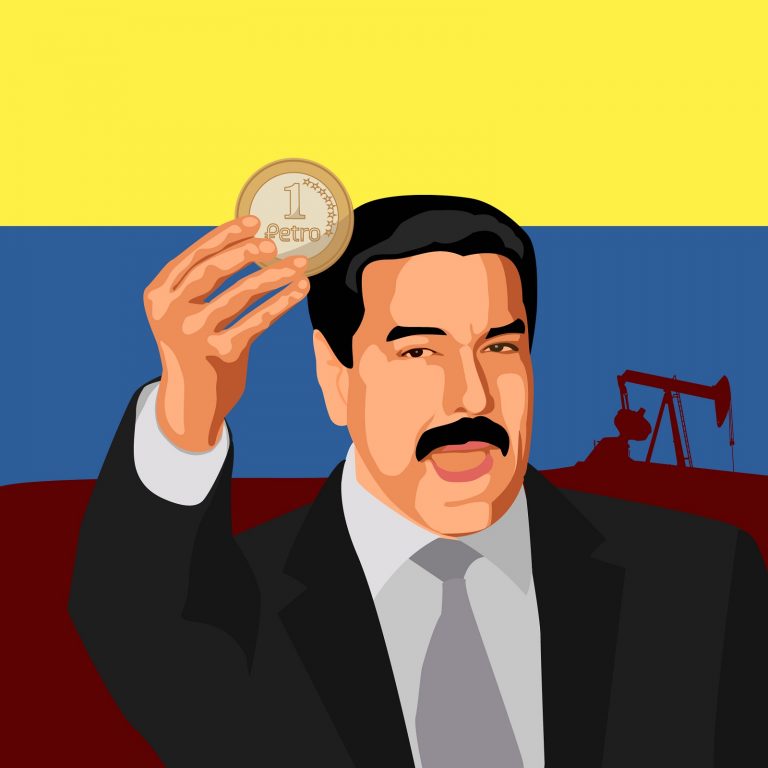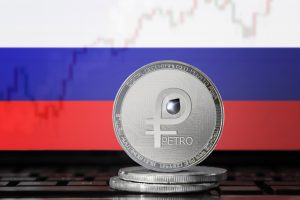Maduro’s Promotion of the Petro Yet to Yield Results

Venezuelan President Nicolas Maduro has been tirelessly promoting the petro, ever since his administration announced the creation of what is now considered the first state-issued cryptocurrency. Although no one is really sure whether the coin actually works, Venezuelans have already seen their salaries denominated in the national crypto and their pensions converted to petro. Imposing the virtual currency on other nations, however, is proving much harder.
Also read: Private Blockchains Have Few Applications, Study Finds
Russia Not Ready for Petro Bookkeeping
 Maduro attempted to push the petro during his recent visit to Moscow, offering Russia the opportunity to use the Venezuelan coin in its oil industry finances. Speaking to journalists in the Russian capital, he revealed that Caracas intends to gradually introduce the oil-backed cryptocurrency in its trade relations with international partners and has already prepared a schedule to do so. The head of the Bolivarian Republic, who met high-ranking Russian officials including President Putin, added that his country will start using the petro for all transactions in its oil sector in 2019.
Maduro attempted to push the petro during his recent visit to Moscow, offering Russia the opportunity to use the Venezuelan coin in its oil industry finances. Speaking to journalists in the Russian capital, he revealed that Caracas intends to gradually introduce the oil-backed cryptocurrency in its trade relations with international partners and has already prepared a schedule to do so. The head of the Bolivarian Republic, who met high-ranking Russian officials including President Putin, added that his country will start using the petro for all transactions in its oil sector in 2019.
The news that the cryptocurrency will be on the agenda of the meetings in Moscow came from the Venezuelan ambassador to Russia, Carlos Rafael Faria Tortosa, who claimed the Russian side has shown great interest in the Venezuelan proposals. Later, Russia’s deputy finance minister Sergey Storchak confirmed the petro has been presented to the Russian officials but said there were no immediate plans to use it in bilateral trade with Venezuela.
This is not the first attempt by Caracas to sell the petro to the Russians. In April of this year, officials from both countries discussed the expansion of the economic cooperation between their governments. Following the meetings, the South American country revealed plans to assemble Russian Kamaz trucks and intentions to pay for the auto parts with petro coins. The agreement, however, was not officially confirmed by the representatives of the Russian Federation who visited Caracas.
Belarus Prefers Raw Materials Over Crypto
 More recently, Venezuela offered another of its allies, Belarus, to pay a portion of the $113 million it owes for housing projects realized by the state-owned Belarusian construction company Belzarubezhstroy using the petro. “The financial situation in Venezuela is tense. We are considering alternative options for repaying the existing debt. One of them is to use the petro cryptocurrency,” said the company’s deputy director Alexander Falevich.
More recently, Venezuela offered another of its allies, Belarus, to pay a portion of the $113 million it owes for housing projects realized by the state-owned Belarusian construction company Belzarubezhstroy using the petro. “The financial situation in Venezuela is tense. We are considering alternative options for repaying the existing debt. One of them is to use the petro cryptocurrency,” said the company’s deputy director Alexander Falevich.
Despite the outstanding debt, Belzarubezhstroy continues to build apartment blocks in Venezuela, even after the departure of all Russian and Chinese companies from the country, Falevich told Sputnik. He added that the Venezuelan authorities do want to pay the money but the Belarusian law currently does not recognize cryptocurrencies such as the petro as legal tender. That’s why Minsk is trying to convince Caracas to repay the debt with raw materials, which Belarus can then re-export to the global market.
Caracas Pitches the Petro to OPEC Members
 Venezuela also plans to offer its sovereign cryptocurrency as a unit of account in the Organization of the Petroleum Exporting Countries (OPEC). International oil trade is dominated by U.S. fiat currency and over the past decades a number of proposals to replace the greenback have been put forward by countries under U.S. sanctions.
Venezuela also plans to offer its sovereign cryptocurrency as a unit of account in the Organization of the Petroleum Exporting Countries (OPEC). International oil trade is dominated by U.S. fiat currency and over the past decades a number of proposals to replace the greenback have been put forward by countries under U.S. sanctions.
In a video address, published last month on Twitter by the state-owned energy giant PDVSA, the country’s oil minister Manuel Quevedo said he intends to acquaint OPEC members with the “main oil-backed digital currency.” He also stated:
The petro will become the digital currency of the international oil trade. We will present it to OPEC. This will be a move to spread cryptocurrencies internationally.
Venezuela wants to start using the petro in its oil exports as soon as the first quarter of next year. Its government has already called on distributers of Venezuelan oil and petroleum products as well as air carriers and sea shipping companies to set up cryptocurrency wallets in order to be able to pay and be paid in petro. The problem is, however, that despite announcing the public sale of the national crypto in October, at this point its buyers can only get “petro certificates,” not the digital coins themselves.
That, of course, did not stop President Maduro from promoting the state-issued Venezuelan coin to another international organization, the regional “Bolivarian Alliance for the Peoples of Our America” (ALBA). “We need to unite for economic liberation and go along the path of joint development,” the socialist leader told his colleagues from nine other member states, while suggesting that ALBA should put the petro in the focus of its monetary policy efforts.
What do you think of Venezuela’s attempts to promote its national cryptocurrency, the petro? Share your thoughts on the subject in the comments section below.
Images courtesy of Shutterstock, Belzarubezhstroy.
Express yourself freely at Bitcoin.com’s user forums. We don’t censor on political grounds. Check forum.Bitcoin.com.
The post Maduro’s Promotion of the Petro Yet to Yield Results appeared first on Bitcoin News.
from Bitcoin News http://bit.ly/2ELvAh7
Labels: Bitcoin
0 Comments:
Post a Comment
Subscribe to Post Comments [Atom]
<< Home